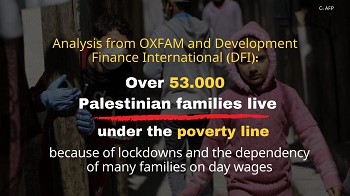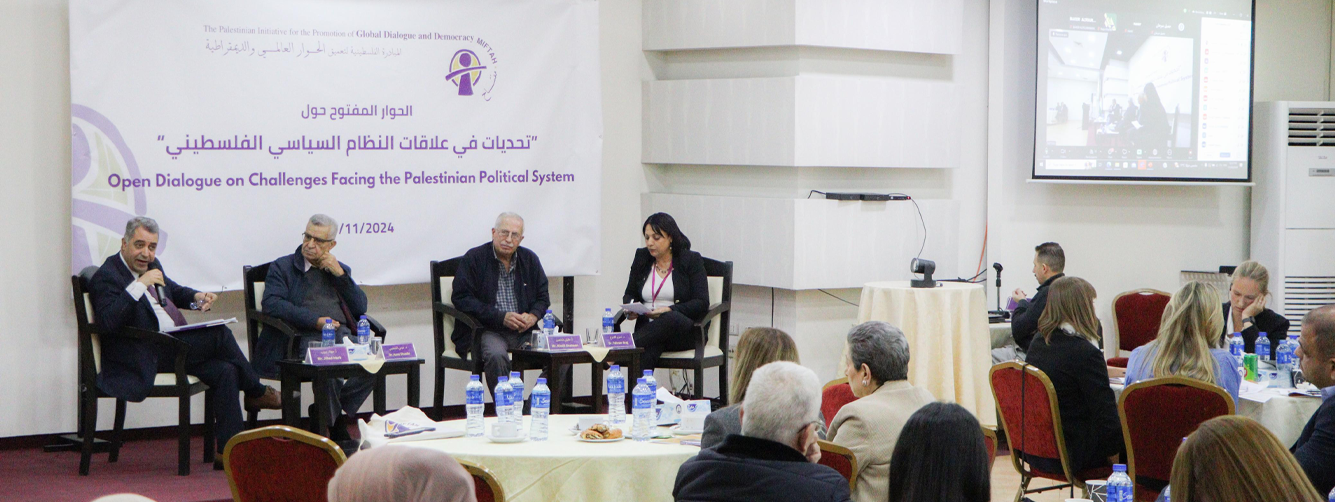
Ramallah – 16/11/2020 – On November 16, MIFTAH held a session in partnership with the Civil Society Team on Public Budget Transparency that discussed public spending policies and the inequality index results for 2020, published by OXFAM and based on several of MIFTAH’s financial reports and research papers. These reports addressed topics such as expenditures in the social sector and the tax system in Palestine, from a perspective of social justice.
Poverty in Palestine
MIFTAH project coordinator Hassan Mahareeq opened with a presentation on poverty in Palestine, noting that estimations from the Palestinian Central Bureau of Statistics (PCBS) showed monetary poverty standing at 29%. That is, one in every six breadwinners in Palestine stopped working during the lockdown because of the coronavirus pandemic and 52% of main wage worker breadwinners did not receive their wages/salaries during the lockdown. What’s more, over 53,000 Palestinian families fell under the poverty line according to OCHA estimates while Palestine’s ranking dropped 33 ranks to 118 of 158 countries (according to the 2020 Inequality Index) published by OXFAM and the Development Finance International.
Ministry of Social Development Interventions
In regards to interventions by the Ministry of Social Development for combatting poverty, Mahareeq explained that as part of its cash assistance program, the ministry provided cash assistance to approximately 105,000 families, also noting that other parties provided assistance.
According to the ministry, at the start of the pandemic, the number of beneficiaries was increased to 115,000 families; the ministry itself has 170,000 families or the equivalent of 950,000 Palestinian citizens registered on its lists. Of this number, 115,000 families receive cash and in-kind assistance regularly while the remainder receives irregular assistance. In this regard, in 2019, three installments were transferred to poor families while the fourth was not. In 2020, due to the clearance tax crisis, there are only three installments.
Recommendations for combatting poverty
Mahareeq showcased a number of recommendations pertaining to policies for combatting poverty such as: the need to increase budget allocations to the Ministry of Social Development for the development of the unified portal for social assistance; committing to the payment of allocations to the poor and transferring the four allocated installments in full, taking into consideration that the fourth installment which comprises 25% of the value of assistance provided to poor families was not transferred in 2019 and 2020; promoting coordination with all assistance-based parties; reviving the oversight of emergency committees; reviving the national cross-sectional strategy for combatting poverty in Palestine; and linking present legislation (Child Law, Disabled Rights Law) to cash assistance programs.
Public spending
According to MIFTAH reports and the Civil Society Team on Public Budget Transparency, spending on the Ministry of Health amounted to 10%-11% of the budget, noting that the Ministry of Health is facing a debt crisis of approximately ILS1 billion. The ceilings allocated to the operational budgets do not coincide with actual demands. One OCHA report pointed out that the coronavirus crisis laid bare the weakness of the health system’s infrastructure in terms of limited medical capabilities in Palestine and limited resources available to the Ministry of Health. In this regard, at the beginning of the state of emergency, the ministry closed most of its primary health services, transferring its medical staff to hospitals and quarantine centers. This meant that the measures taken to combat Covid-19 came at the expense of primary health services and services unrelated to the pandemic.
According to the OXFAM analysis, Palestine ranked 98 of 158 regarding public spending and public services. However, even with the slight increase in expenses on the health sector, which amounted to $571 million in 2019, 41% of Palestinian families still covered their own health expenses. Also, according to MIFTAH’s biannual report on social sector expenditures, the share of the Social Development Ministry was 7.7% of the overall public budget as of June of this year.
The recommendations on public spending included a call for adopting comprehensive and mandatory health insurance; the fair distribution of all health services to ensure access for all citizens; an increase in spending and allocations of the Ministry of Education and Ministry of Higher Education and Scientific Research; taking into consideration the fair distribution of university grants; the need for an emergency plan to allow the Ministry of Health to address its programed operations, which were postponed because of the pandemic.
Tax Justice
The presentation included the OXFAM analysis on fair tax, which showed the clear weakness in the PA’s tax management due to its dependence on collection from limited-income citizens. This, the analysis said, reinforces inequality between the rich and poor and between women and men. For this reason, Palestine is among the bottom 10 countries in the index in regards to the tax system. According to the Tax Justice Index Report, the current Palestinian tax system and its various components, is fertile ground for continued tax leakage and tax evasion and for allowing the more vulnerable sectors to bear the heavier tax load.
The recommendations on tax justice called for the need to review conventional Palestinian policies and approaches that support linkage to the Israeli economy; adopting a progressive tax system for dealing with taxed sectors; ratifying a package of local laws to motivate imports and local products A1, A2 and B, and exports; formulating smart technical restrictions on imports from Israel; maximizing benefit from the goods lists in the Paris Protocol and conducting a comprehensive review to amend the quota in place since the protocol was signed on some goods, to coincide with increasing Palestinian needs.
The session was held as part of the “Finance for Development” project, which MIFTAH carries out in partnership with OXFAM. The project is in line with MIFTAH’s strategic approaches to continue lobbying and advocacy efforts to ensure social justice and equality in the development of public policies and also to promote good governance in Palestine.








